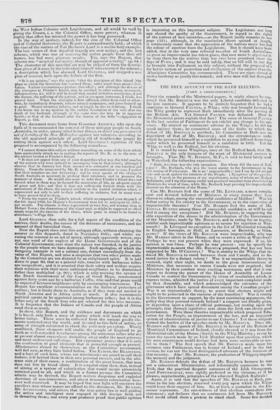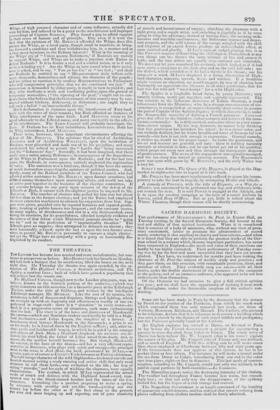Fnost the remarks of the Ministerial papers, it might almost
be sup. posed that Mr. Rola:rex was the only Liberal candidate defeated in the late contests. It appears to be entirely forgotten that he had a
coadjutor in General PALMER, a Whig ; who was brought forward by the Whig gentry to represent Bath immediately after the passing of the Reform Act. Yet General PALMER was defeated. How do the Ministerial prints explain that fact ? The votes of General PALMER in the last session of Parliament do not exhibit any change in his opi.
tains. He uttered no sentiments adverse to the Whigs ; lie did not
speak against them ; he committed none of the faults to which the defeat of Mr. ROEBUCK is ascribed ; his Committee at Bath was in.
dependent of that of Mr. ROEBUCK ; • and the circumstances under which he presented himself as a candidate in no way differed from those under which he presented himself as a candidate in 1834. Yet the Whig, as well as the Radical, lost his election. It is stated by some Whiglings, once of the Radical band, that Mr. ROEBUCK is the only instance of the want of 'Ministerial success in boroughs. Thus Mr. W. BARRON, M.P., is said to have lately used at Waterford, the following expressions- " Bath, it is true, was the only exception. But whom did the men of Bath reject ? Mr. Roebuck, who was the worst enemy to the Government in the last session of Parliament. He is an ' impracticable ;' and I say lie did act and vote and speak against the interests of the People. ( $ymptoins of disrwroba. lion.) I speak in the presence of my constituents, many of whom are Radical
Reformers, and I say that many useful and practical measures were abandoned by Ministers for want of time, while Mr. Roebuck kept pressing his impracticable theories on the attention of the House."
Can Mr. BARRON find the name of Mr. LENNARD, a most compla- cent and devoted follower of Ministers in every course they have
chosen to adopt, among the successful candidates at 3Iuldon ? Was his defeat owing to his enmity to the Government, or to the expression of impracticable theories ? Can Mr. &most find the name of Mr.
HOWELL BUXTON among those of successful candidates, or will he not find it among the exceptions ? Did Mr. BUXTON, in supporting the able exposition of the abuses in the administration of the Government of the Mauritius, made by Mr. ROEBUCK, and in voting for an inquiry,
exhibit such impracticable opinions as to secure his rejection at Wey- mouth? Is Liverpool no exception in the list of Ministerial triumphs
in English boroughs, or Hull, or Lancaster, or Berwick, or Glou-
cester If the views of Mr. ROEBUCK were impracticable, why was Mr. BARRON silent in the House, and so severe a critic at Waterford?
Perhaps he was not present when they were expressed : if so, his
opinion is wordsless. Perhaps he was present : can he specify the impracticable measure that Mr. ROEBUCK proposed, that has not been supported by Mr. O'CONNELL ? Was it enmity to the Whigs that in- duced Mr. ROEBUCK to stand between them and Canada, and to de- mand justice for a distant colony ? Was it an impracticable theory to
contend, night after night, no doubt to the great inconvenience of
Ministers, that measures to coerce Canada were not required ; that Ministers by their conduct were exciting resistance, and that it was unjust to destroy the power of the House of Assembly of Lower
Canada to control the Government, by virtue of resolutions which, in express terms, admitted the justice of every important complaint made by that Assembly, and which acknowledged the existence of the grievances which have spread discontent among the Canadian people ? Was it an impracticable theory, to assert that electors might and ought to be protected in the exercise of the franchise? Was it enmity to the Government to support, by the most convincing arguments, the policy that they pursued towards Ireland ? a support not blindly given, or depending upon a share of official patronage, but resting upon the principle, that through legislative acts alone the Irish can obtain good government. Were those theories impracticable which proposed Edu- cation for the People, an improvement of the law, and an improved
system of administration of justice to our Colonies ? Yet these subjects formed the burden of the speeches mode by Mr. ROEBUCK. Does Mr. 'Lennox call the speech of Mr. ROEBUCK in favour of the Reform of Municipal Corporations of Ireland, (loudly cheered as it was from the Ministerial side of the House,) hostile to the Whig Ministry ; or can he
name the speech made by an Irish Member upon that question, which
his own countrymen would declare had been more serviceable or use- ful to them ? The first speech that Mr. ROEBUCK made upon his entrance into Parliament, was in favour of Ireland ; and in the last session, he was not the least distinguished advocate of the interests of that country. Alas ! Mr. BARRON, the profession of Whiggery impairs the memory and the judgment. Mr. BenaoN defends the defeat of Mr. ROEBUCK because he was not a subservient Ministerialist, and inferentially represents to the Irish, that the practical despotic extremes of the Irish Orangeman, Lord PowzascounT, were rightly preferred to the virtuous, or if he pleases, impracticable, principles of the educated English Radicals ! Again, it is said that the speeches of Mr. ROEBUCK at Bath, pre- vious to the late election, removed every peg upon which the Whigs could hang their support of him. So, at least, a quotation in time Ex- aminer represents. An eye-witness of that election contradicts this statement ' • and declares that no sentiments fell from Mr. ROEBUCK that could afford them a pretext to stand aloof. Some few decided Whigs, of high personal character and of some influence, actually did vote for him, and refused to be a party to the mischievous and improper proceedings of Captain SCOBELL. They found a peg to afford support i in their sense of honour and of principle. But, even if it were the fact that the opinions of Mr. ROEBUCK offended the Whigs, does this excuse the Whigs, as a local party, though small in numbers, in bring. ing forward a candidate and then withdrawing him, in a manner and at
i
a time most injurious to the Reform interest? What is the meaning of the Whigs' cry of " Union among Reformers," if Radicals are merely to support Whigs, and Whigs are to make a junction with Tories to defeat Radicals ? Is it to denote a real and a cordial union, or is it only to be a deluding cry ? Are the Whigs to turn round when their assist- ance is asked, and to say, " You go too far," or " too fast ;" and shall not Radicals be entitled to say " Misgovernment daily inflicts evils upon thousands, demoralizes and vitiates the character of the people ; and we refuse to sanction it by sending Representatives to Parliament who will compromise principles that we are convinced are just" If concession is demanded by either party, it ought in turn to yield it ; and they who vindicate a weak and vacillating policy, upon the ground of temporary necessities, (" the ripening of the pear,") ought not to con- demn those who believe that the Government of this country may be con- ducted without trickery, dishonesty, or dishonour ; nor ought they to call such a belief " an impracticable theory."
Much declamation is common upon the interference of Tory land-
lords with the votes of their tenants ; but Bath afforded an instance of Whig interference of the same kind. Lord MAN VERS wrote to his agent adversely to the Liberal cause, and many can testify to the effects of his interference. The Town. Council will probably Investigate the facts. If Durham has its Tory intimidator, LONDONDERRY, Bath has its Whig intimidator, Lord MA N VERS.
There were, however, three important circumstances affecting the
defeat of Mr. ROEBUCK. The opinions that he cited of Archbishop CBANMER and of Archbishop WHATELEY, upon the institution of Sundays, were placarded and made use of to his prejudice ; and many condemned his refusal to permit the " Lord's day" being converted into the " Informers' day." Secondly, it had been imagined, that there really was a union among Reformers, in consequence of the dependence of the Whigs in Parliament upon the Radicals ; and for the last two years, the Radicals, in consequence, entirely neglected the registration of votes. The omission was a fatal one, though it has been the source of much instruction respecting the opinions of political parties. And, thirdly, many of the Radical members of the Town-Council, who had afforded active assistance to Mr. ROEBUCK upon former occasions, bad differed among themselves upon municipal affairs, and would not take an active part together in the business of the election committee. If any censure belongs to any party upon account of the defeat of the Liberals ut Bath, it cannot with the slightest justice be imputed to Mr. Emmett The number of electors who polled for him was but about
340 less than at the former election ; and yet the Tories had employed the most extensive machinery to alienate his supporters from him. Sup. pers were given, presided over by reputed baronets and reputed gentle- men ; treating at public-houses was frequent ; and the constant scenes, for many nights, of drunkenness and riot in a city distinguished, even during its elections, for its peacefulness, afforded complete evidence of the source of that defeat which Ministerial journals ascribe to " going too far " and to the profession of " impracticable theories." The
Liberals gave no suppers; they attempted to debauch no elector ; they most honourably refused, upon the last as upon the two former occa- sions, to permit Mr. ROEBUCK personally to canvass a single elector : and yet the Whigs have no sympathy with a party so honourably dis- tinguished by its conduct.



























 Previous page
Previous page